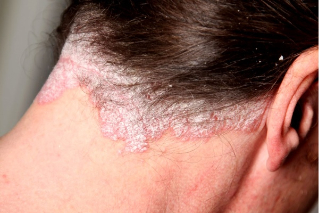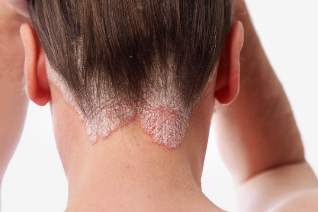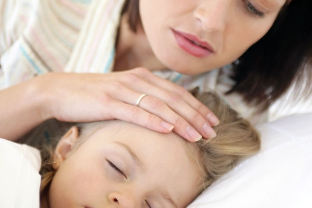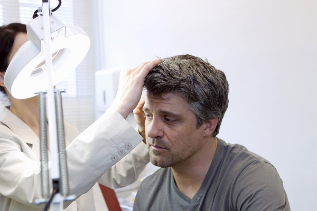The psoriasis of the skin contagious disease that occurs in 1 in 100 people, 80% of cases it turns out, the defeat of the scalp. This formation results in red plaques or patches, between which it can be seen that the intact skin. The inflammation can expand, unite with each other. Why psoriasis as a cure, find out below.
A brief summary of the pathology

Psoriasis on the head of a autoimmune disease. This is the conclusion the doctors after studies of the plaques showed a characteristic of autoimmune diseases changes, therapy, which can suppress the immune system drugs significantly improves the general condition. The disease doesn't get the patient to a healthy person.
Psoriasis can affect anyone, but the clinical experience allows you to identify the main risk groups. So, often, the pathology affects women, genetically inherited form of can feel the 15-25 years. Cases more than 50% related to psoriasis in one form or another. This means that the risk of such diseases is higher among those whose parents, brothers and sisters also have such a diagnosis. Psoriasis, on the scalp, as usual, hit the following sites:
- parting;
- the upper part of the forehead;
- the area behind the ear;
- whiskey;
- the back of the head;
- the skin of the ears, including the ears;
- the arches his eyebrows.
Typically, these are the psoriasis is a wave-like nature of the flow, that includes alternating periods of improvement and exacerbation stage. While the affected areas appear, red teardrop-shaped boards fat content, which is regularly sloughed off because of the itching. Such inflammatory process leads to serious health consequences, but there will be a because of serious psychological problems. Often it's a vicious circle, in which psoriasis causes stress, this in turn, causes complications the incidence of the pathology.
The disease itself does not cause hair loss but a temporary hair loss can lead some methods of therapy, stress, or injury can cause the skin. Usually the hair grows back after cleaning, the stabilization of psycho emotional state.
Why?

The doctors have not yet identified the exact causes that trigger the inflammatory response to excessive synthesis of the skin cells of the patient's body. At this point the leading hypothesis genetic. It States that an individual's innate predisposition to accelerated renewal of skin cells (the main cells of the skin the human skin). The manifestation of psoriasis such tendency causes a specific reaction in the immune system:
- The body begins to rapidly produce new cells that form psoriasis patches.
- A more serious inflammation of the skin in the affected area (the organisation is treated like some kind of alien).
- The more damaged the skin under the influence of the immune system, the more active the team the epithelial cells.
For a long time, the genetic factors remain in a latent condition, but he wakes up under the influence of unfavorable factors. These are the following:
- The stress. Changes in the nervous system, because the diseases, the activity of all organs, including the skin. In the end, this leads to changes in the division of the epithelial cells.
- A common injury to the skin. Provoke errors in the process, the division and growth of epithelial cells.
- Infectious diseases. The bacteria attack the human immune system, especially if the disease is chronic. As a result, the immune system is constantly the tension, and begins to attack the epithelial cells.
- The dryness and skin sensitivity. In this case, the skin is often suffering from trauma, therefore, likely to develop psoriasis.
- The climatic conditions. When dry, cold air, the skin goes through, increased load and, therefore, the possible violations that lead to psoriasis.
- The diseases of the endocrine system. They cause disturbances in the development of melatonin, to provoke increased secretion of growth hormone.
Another popular hypothesis says that develop psoriasis due to violation of the metabolism. In this case, the organization is specifically responding to the stimuli of the rapidly dividing cells in the skin. Usually, the skin renews itself within 3 weeks, the patients it occurs within 5 days, which is the head of a number of plaques. In this case, because the aggravation can be the following factors:
- damage to the scalp;
- emotional stress, stress;
- hormonal disorders;
- the diseases of endocrine system;
- the bad habits (Smoking, alcohol consumption);
- infectious processes in the body;
- improper nutrition;
- the use of certain medications;
- hypothermia, or prolonged exposure to the cold;
- the use of low-quality care products of the scalp.
In some cases, the starting point for the development of psoriasis may be pathology of the immune system that may occur as a consequence of severe stress, or an infectious disease.
It turns out that HIV-positive suffering from psoriasis 3 times more often than healthy people.
As the pathology visible?
Psoriasis develops slowly, it is possible to identify different stages of the following processes:
- The surface of the skin appear pink rash, which is round, the top covered with numerous plaques in white.
- The lesions gradually grow and increase in diameter. In the end, they turn into thickened psoriatic plaques because itching, burning. Subsequently, a strong inflammatory process.
- Tissue grows excessively under the pressure of excessive reproduction of ectodermal cells in the plaques, and excessive accumulation of lymphocytes, macrophages. This will lead to thickening of the skin in the affected areas, as well as the formation of red spots on the area of the hair growth.
- The patient's malaise, and weakness. You can jump your body temperature.
- The skin is tender, painful, dense. Gradually loses its flexibility, becomes, hard covered with plaques which flakes quickly.
- If combing the scalp is covered with bleeding scratches, cracks.
- Plaques gradually shed, so the hair you see massive layers, similar to dandruff.
- The itching was becoming more intense, but won't let, let the person all the usual stuff.
- Is the person depressed or constantly breaking down, I feel great aesthetic discomfort.
- Pathology of the distributed over the scalp, but other parts of the body.
To minimize the manifestations of psoriasis are needed, when the first lesions in the head to consult a dermatologist to be examined and begin treatment.
Characteristics of symptoms in children

Psoriasis of the scalp, the child develops almost in the same way as the adults, but most often the disease is felt such symptoms:
- redness of the scalp, which is seen even in the hair;
- wet softening of the skin, which the drug, the so-called maceration;
- desquamation plaques;
- the clusters with the formation of the plaques in certain areas of the scalp.
The younger age groups in the psoriasis often resembles a formation of diaper rash. The disease develops very slowly, difficult to treat.
Classification pathology
Psoriasis scalp is classified by two parameters - shape, and the stage of development. It depends on them what looks like a disease. All parameters will be considered separately.
Form
The shape of the psoriasis is of two types:
- Easy. Mainly manifested in the head in the form of a single lesions. Typically, the plaques little covered with thin plaques.
- It's hard. Arthritis items that appear on the entire scalp. The size of the plaque, increasing thickness, as the mild to severe disease.
Stage
Experts identify three stages of the pathology:
- Progressive. The scalp new lesions. Usually affects the area, the contour of the hair growth. Psoriatic elements peeling. Gradually, the Islands, the rash may merge, forming extensive lesions. If the phase is under, to return the patient to the already available elements distributed on the periphery, the so-called phenomenon Kebner.
- Stationary. The inflammatory process remains, but no new rash. This stage is characterized by the blunting of the growth of the plaques, the absence of a hyperemic rim along the contour of the skin elements.
- Regressive. Reduce the volume of lesions, which indicates that the effectiveness of the therapy. Gradually disappear, the existing plaques, which are replaced by liver spots. The patient is no longer a worry, desquamation, itching, and other symptoms of the pathology.
Diagnosis

If you had a rash on the scalp, you need to consult a dermatologist. Also, you may consult a specialist in hair treatment (officia), as well as a beautician who will help you choose the shampoos and other care. The diagnosis of the disease plays a major role in determining the psoriatic triad, in which such phenomena as:
- Stearic acid spots. Enhanced scaling, plaque or a silver color, similar to stearin.
- Arthritis movie. If you remove the plaque, the place appears shiny, wet surface.
- Blood dew. If combing plaques appear, drop point bleeding.
These symptoms allow the diagnosis of the visual inspection. The doctor takes into account the data history, including makes it clear that the patient's relatives with the psoriasis. To confirm the diagnosis, your doctor may order a biopsy (biopsy material from the affected areas), as well as the installation flora to rule out a fungal infection. In the case if the generalized form of psoriasis have to keep the general analysis of the blood. While intoxication will show a high erythrocyte sedimentation rate (ESR), and elevated white blood cell count.
General medical
Psoriasis on the scalp require individual treatment, which helps to relieve the unpleasant symptoms, and most importantly-to achieve long-term remission in any form of pathology. For this purpose, is often appointed in complex therapy. Each component deserves special attention.
Is designed to the suppression of chronic inflammatory reactions, excessive formation of, but keratocytes, as it's the pathological processes underlying disease. As part of the total therapy, the doctor may prescribe the following medications:
- it means that the specific immunotherapy (pastry pie see, ATP);
- vitamin complexes;
- immunomodulatory;
- aromatic retinoids (Etretinate, Acitretin);
- cytostatics;
- corticosteroids;
- solution Gemodeza infusion injection.
The host cytotoxic drugs, and corticosteroids is justified in the case of heavy course of the psoriasis, or if the severity of the symptoms on the scalp. If the psoriasis can complicate the accession of the infection, the treatment is antibiotics.
The framework for the entire treatment, the doctor may also prescribe antidepressants. They are necessary in order to reduce and resolve associated with psoriasis emotional problems - depression, stress, increased anxiety, phobia social. In fact, such drugs improve the patient's resistance to the stress reduce the frequency and severe exacerbation of psoriasis, on the background of nervous tension, improves the quality of sleep. Some drugs anti-histamine effect, which is why it helps to relieve the itching.























